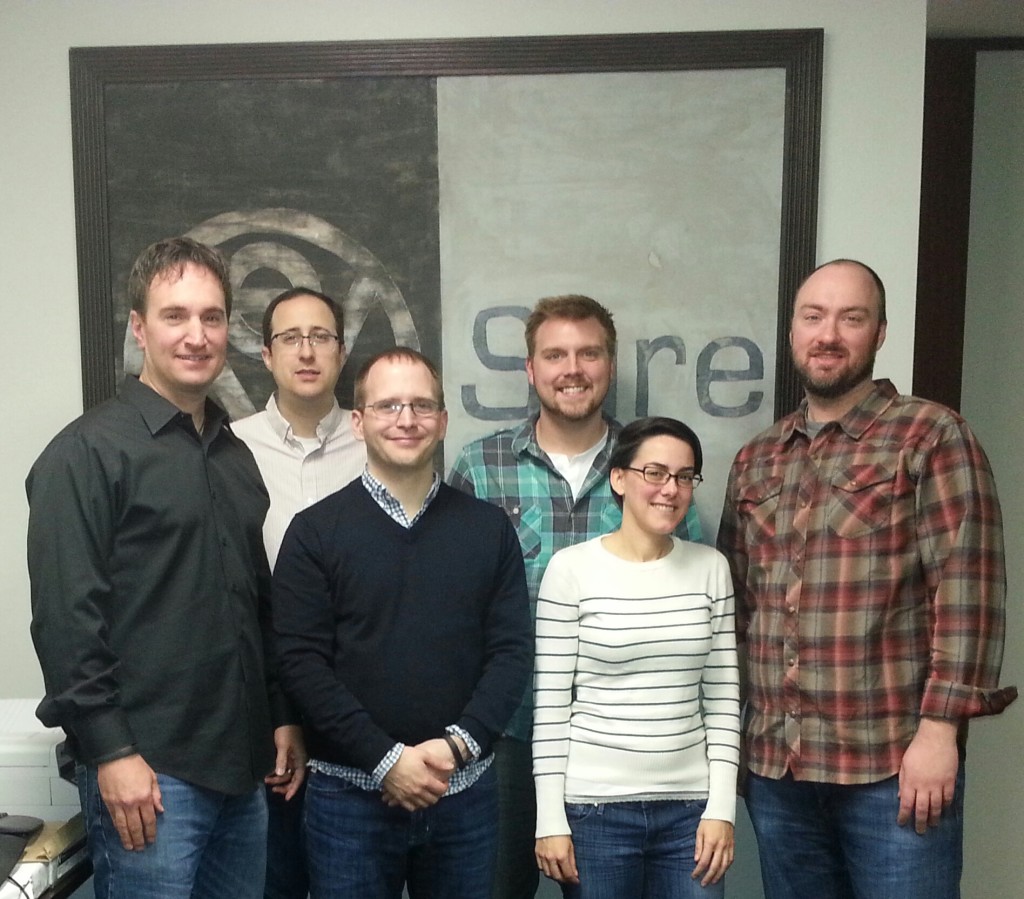By SUSAN LAHEY
Reporter with Silicon Hills News

EvoSure Team, photo by Susan Lahey
Talk to the founders of
EvoSure for 30 minutes and even if you thought insurance was the province of wary gray men in gray suits, you’ll come away convinced that it’s an exciting, complex maze of chance and judgment, fraught with risk in every direction, from human frailty to Acts of God. It’s breathtaking.
But, because of all of this complexity and danger, it can be a huge challenge, especially in the commercial lines, to find an insurance underwriter willing to cover specific clients. Some insurance situations are boilerplate, but others have variances that make them unsavory to particular insurance underwriters. And since, according to EvoSure advisor Michael Boyle, CEO of Perseus Technical Strategies LLC, processing a request for a quote costs around $200 each, 80 percent of brokers’ requests for underwriting are declined without even being quoted.
Finding an underwriter who will cover your particular client’s risk, Boyle said, is like being put in a room with a handful of darts and a dartboard that’s allegedly on the other side of a sheet. There’s a guy standing in the middle, repeating: “Darn, you missed.”
Carriers might tell brokers that they will underwrite manufacturing, but when the broker comes back with a manufacturing firm client in Michigan, the underwriter says they don’t handle manufacturing in Michigan. When the broker returns with an Ohio manufacturer it appears a go, until it turns out the company manufactures yogurt and this underwriter doesn’t handle food manufacturing. Then if the broker shows up with a sheet metal manufacturing client in Illinois, it looks hopeful until the broker tells the underwriter it’s a $110 million plant and the broker doesn’t handle sheet metal companies over $100 million.
EvoSure, Boyle said “Seemed like the single most revolutionary approach to this problem anyone had ever taken.”
Calling itself the Match.com of the insurance industry, the EvoSure platform lets subscribing insurance brokers get online, type in what they’re looking for and instantly access a list of underwriters who are interested in covering that kind of business. From there, the brokers just have to connect with the list of underwriters to drill down which one is the best match for the company.
According to J. Brandon Foster of Walker Myers Insurance and Risk Management, it takes “Massively less time,” than the old system, and creates much better relationships between brokers and underwriters.
Birth of a Solution
EvoSure co-founders Matt Foran, CEO and Brian Wood, COO, met in 2008 when both were working for Marsh & McLennan and both were contacted in their respective home towns and asked to move to New York immediately to head up the project restructuring Marsh USA. Foran had always loved business. As a kindergartener he wanted to be a stockbroker. He started investing at the age of 14 and was a broker who “could sit with CEOs of investment firms at 22 and I thought that was very cool.” Wood studied psychology but while working on his master’s degree worked at a bank call center and wound up getting promoted so rapidly he ended up managing a call center at Bank One and later being recruited by Trilogy to work on a startup, InsuranceOrder.com
When they were put in charge of restructuring Marsh USA, they had to eliminate $260 million in costs in three months.
“You learn a lot, very quickly, about the right sizing of business models,” Wood said. “We both believed the company should not have to do this again, if we do it right.”
That meant focusing on the core business and making careful decisions as they went through to keep what was central and eliminate what was peripheral.
After that project, Wood went on with Marsh & McLennan and Foran went on to become director of strategy and operational planning and execution for Zurich Financial Services, which owns Farmer’s Insurance.
“I was head of strategy for specialty products and I got to see the brokerage side, all the challenges they face, and the underwriting side, and to understand the pain and the root cause,” Foran said.
Both Foran and Wood are big into understanding the root cause.
“If you look at the challenges between the brokerages and carriers by themselves you can’t solve a lot of them. But if you take three steps back you can solve the initial, big problem.”
Foran had kept in touch with Wood over the years and when he came up with the idea for EvoSure, he called him and told him he wanted to fly from Chicago to Austin to talk to him about it. Wood agreed, hung up the phone and said: “What did I just do?”
A self-described “person of faith,” Wood had already co-founded a startup and was racked with guilt over agreeing to meet with Foran. One day, before the meeting, his co-founder said “You seem like something’s weighing on you, what’s up?”
When Wood told him about the impending meeting, his co-founder reminded him “Remember I told you about three weeks ago that I had a strong feeling you were going to wind up doing something else?” Wood recalled the comment, but at the time he had dismissed it, it came so out of the blue. Now it looked like a sign.
Austin, Cheap and Friendly
Their first order of business was to hammer out the company culture.
“The bigger thing for me was what kind of company do you want to build?” Wood said. “How do you want to support your clients? How do you want them to think about you? How do you want employees to think about their days? We were focused on the cultural things—what it was going to be like.”
“Austin is really competitive from a personnel standpoint,” Foran said. “It’s all about relationships. People have to trust you. People have to know that you know what doing…and they have to know how they fit in and where you want to take the company. Brian built an incredible team. He added one person and they’ve added another person…. Every single personality drives your culture so it’s critical that your very diverse personalities are driven toward a singular vision of serving clients and serving each other.” Team members include Josh Peterson, vice president of product who worked at Marsh & McLennan, Google and Bazaarvoice, who they credit with developing a lean approach to creating the business.
Some of their advisors had said it would take $10 million to $15 million to get the company off the ground. They were thinking in terms of onsite servers and custom security. Instead, they went with cloud solutions that had top level security at a fraction of the cost. They bought used office furniture and only spent money on people and travel. Many people in the Austin tech community advised and coached them, helping them build a company frugally. That was one of the extraordinary things about building the company in Austin, the community really wanted to help them succeed.
The company operates on an access model, Foran said. Underwriters pay $75 per underwriter per month. Brokers’ fees are based on the size and complexity of the brokerage. Founders didn’t say exactly how many companies had signed on but that they were confident of reaching critical mass. If the top 10 carriers join, Boyle said, the other 30-50 have to follow. And EvoSure benefits them as well as brokers. Currently they’re missing out on a lot of opportunities because of how much it costs them to analyze them.
Finally, a Solution
Since this problem has been around so long, it seems odd that no one has solved it before. Boyle said others have tried. One, created by LexisNexis was trying to create a system for electronic submissions to be possible between every carrier and every broker but it required the companies to put “all this plumbing in place” and many carriers wouldn’t support it. EvoSure’s user experience is simple.
“It really delivers value from day one to the brokers using it. It doesn’t require them to rebuild the entire ecosystem of technology.”

EvoSure Founders Matt Foran and Brian Wood, photo by John Davidson, featured in the Silicon Hills News Austin 2015 Tech Calendar
![]() Sprinklr announced Thursday its acquisition of Pluck, an Austin-based social media company.
Sprinklr announced Thursday its acquisition of Pluck, an Austin-based social media company.
